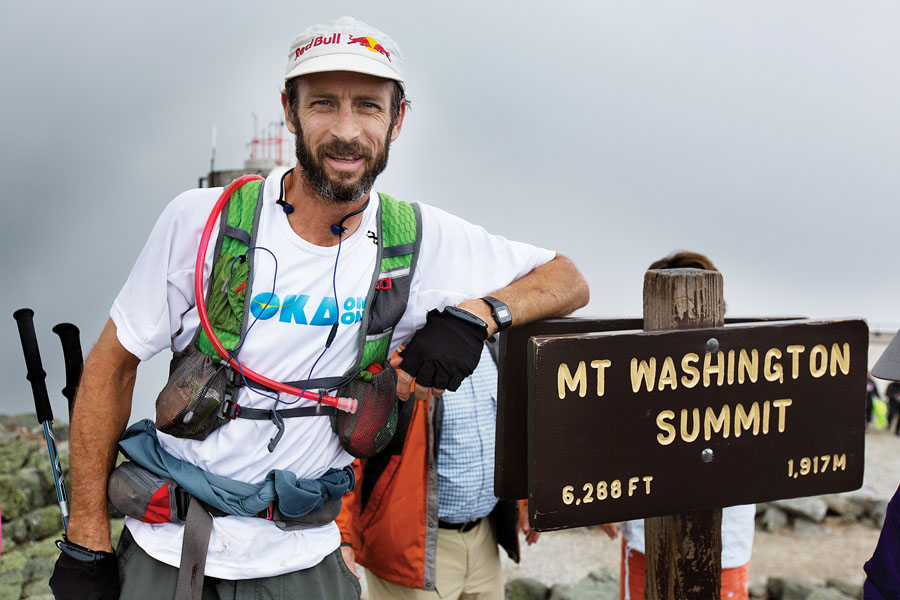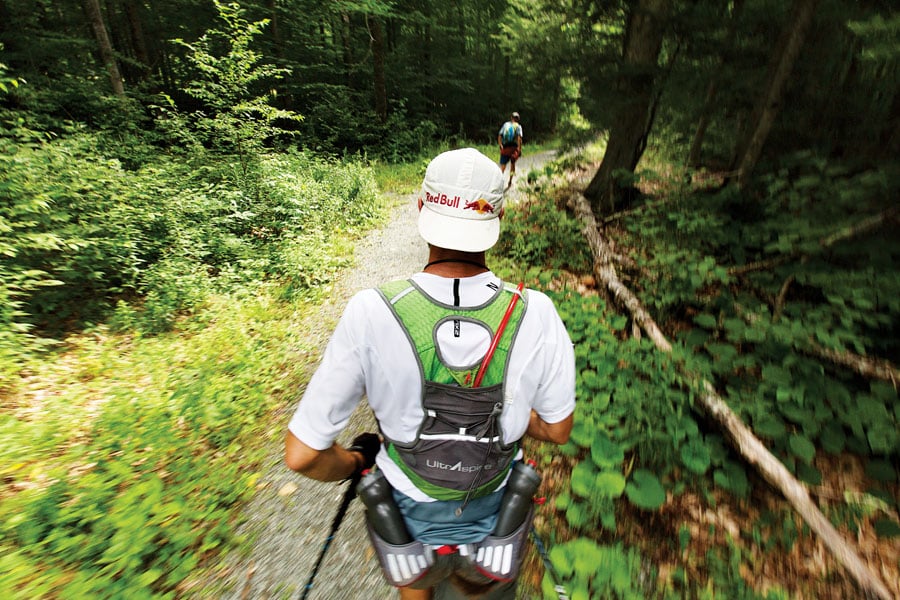Karl Meltzer is one of the best endurance athletes of all time. The 48-year-old New-Hampshire ski bum-turned-ultrarunner has the most 100-mile wins in the world (38). He’s finished 143 ultramarathons in 153 starts, nearly half of which he’s won, and in 2010, Meltzer set the record for the 2,064-mile Pony Express Trail, running from Sacramento, Calif., to St. Joseph, Mo., in just 40 days.
This past April, Meltzer took his need for speed to another level by breaking the world record for speedgolf—in 12 hours, he played 230 holes (that’s additionally about 100 kilometers, or 62 miles, on foot), beating the record he personally set in 2015 by one hole.
It’s no wonder, then, that Meltzer’s sobriquet is ‘Speedgoat.’
Yet for all his podiums and namesake legacies like the Speedgoat 50K and Hoka One One Speedgoat trail running shoe, one athletic feat has frustratingly dangled just out of Meltzer’s reach on two previous occasions—the fastest known time (FKT) for completing the Appalachian Trail.
“When I came home [in 2014], I swore I’d never go back to the trail again,” Meltzer says.
Meltzer’s fascination with the Appalachian Trail began well before he and his buddies with Backcountry.com decided he should do it and document it online (remember WheresKarl.com?) in 2007. As a child, Meltzer hiked throughout New England’s Presidential Range and White Mountains with his father, following the very white blaze that would later become his fixation.
When Karl finished the trail 54 days, 21 hours, and 12 minutes after setting off from Mount Katahdin on August 5, 2008, he was limping and exhausted, his blog quiet. He had missed the record by a week due to heavy rains in Maine and a bout of tibialis anterior tendonitis, which forced him to rest for four days to alleviate the pain and inflammation in his shins. Despite failing to beat the record, Meltzer’s time continues to rank as the fourth fastest completion of the trail.
“I really wanted to finish the trail no matter what my time was,” Meltzer says, “but I was glad to be done when it was over.”
Except, he wasn’t done with the trail. Not yet. Six years later, Meltzer was back, and this time, without the pomp and circumstance of a blog, a Red Bull campaign, and the public eye. He bought a van, modified it for camping, hired his friend to crew, and quietly hit the trail.
“You don’t want to hype it up much before you do it,” Meltzer says of that second attempt. “It’s a bad idea because not only does it put pressure on the runner but, what if you fail? Everybody likes to see failure.”
With a thru-hike’s worth experience under his belt, Meltzer felt confident. The mistakes he’d made in 2008 wouldn’t be repeated. He knew to get a larger pair of shoes to avoid tendonitis, to respect the weather and wait for the rain before setting off. But a month and a half before leaving from Katahdin, Meltzer injured himself and spent the weeks leading up to his departure recovering.
“I really did not go into it in very good shape,” Meltzer says. “Once I fell too far behind the pace, I mentally talked myself out of it and succumbed to the demons.”
And so, on day 30, just 50 miles behind Jennifer Pharr Davis’ 2011 record pace, Meltzer called it quits.

For most people, the story ends here. Even Meltzer, ever the optimist, had no intentions of returning to the trail. He took some time off to let his mind and body heal, refocused his energy on racing ultras again, and all but swept the record under the rug until his contact with Red Bull asked him to go back to the trail…again.
Initially, Meltzer declined. It was too soon, he said. But the seed was planted. The idea, too tempting. By early 2015, he had agreed to take another stab at the record.
“It’s not so much about the record,” Meltzer says. “Granted, of course I’m going for the record, but I like being out there. I like being on the AT. I used to call her ‘Old Mother A.T.’ You just have to roll on with the punches and know the A.T. will always punch back at you.”
Meltzer’s ready for the fight. Over the past year, he’s returned to different sections of the trail to tackle weeklong stints in Maine, New Hampshire, and Vermont. When Scott Jurek was in the midst of his record attempt in the summer of 2015, Meltzer joined him in the Shenandoahs to crew, and recon, for his own upcoming adventure. Though Meltzer competed in four ultras earlier this year, he laid running aside in the spring to focus solely on hiking and terrain familiarity.
“It’s not about speed,” he says. “It’s about adapting to what I encounter every day. You can’t train to run faster on the A.T., ’cause guess what? After four days, your legs are lead and you’re not going anywhere fast. It’s about being more efficient.”
Up before dawn, on the trail by 5 a.m., in bed within a half hour of stopping. That’s Meltzer’s daily strategy. Sometime during the first week of August, weather pending, Meltzer and his crew, an alternating combination of friends (including Scott Jurek), Meltzer’s wife Cheryl, and Red Bull representatives, will set off southbound from Mount Katahdin.
He’s not a stickler about food, and he’s definitely not a vegan-touting athlete. In fact, Meltzer’s go-to trail snack is homemade crepes stuffed with bacon. Cheeseburgers, quesadillas, pizza—basically, he says, “I’ll eat more or less anything so long as it’s reasonably healthy.” At the end of his 50-mile days on the Pony Express, Meltzer was even known to kick back with his feet up and a cold beer in hand.
Concerns for Meltzer have less to do with fuel (he just needs 6,000-7,000 calories) and more to do with efficiency. No social runs or individual selfie requests, he says, though he’ll gladly snap a quick group shot before zipping off again. Rightfully so, Meltzer’s approach for steadfast, methodical movement mostly involves getting the proper amount of sleep and caring for his feet, or anything else that could potentially become an “itis.”
“If you’re two or three days in and your feet are already a mess, that’s a problem,” he says. “Anytime that something happens to your feet, you’re screwed because you’re constantly walking in pain and you don’t heal overnight. It just compounds and it becomes worse and worse as time goes by.”
And the stress of that, of having to wake up and walk a marathon and a half on tender feet through rugged terrain, reduces the amount of restful sleep he gets. Meltzer’s aiming for eight hours a night, a must, he says, for even six hours a night would eventually cause spells of hallucinations.
“My first two attempts, I had foot problems. Every morning when I would get up, it would take me 45 minutes to an hour to tape my feet,” he says. “It killed so much time. An hour a day times 46 days is 46 hours, which is like, 100 and some miles lost over a foot problem,” which, let’s face it, isn’t very efficient.
Perhaps of all the people who have attempted the A.T., Meltzer comes with the most intimate knowledge of the difficulties that can arise, be it personality clashes between crewmembers, foot problems, or weather. His experience racing 100-milers has certainly helped keep him fit, and more importantly prepared him in the way of mental fortitude. By all accounts, this is the year for Meltzer to shine, yet even he knows that there are certain elements of an FKT, on the Appalachian Trail especially, that are simply unpredictable.
“Nobody wins it in the first three days,” he says. “You have to bide your time and not necessarily look at the whole picture, just look at the day-to-day. The record is doable, but with all due respect, anything can happen out there. I can fall and smash my knee on day two.”
It is this, the capricious nature of the trail, that former record holder Jennifer Pharr Davis knows and loves. She’s never met Meltzer before, though the two shared the trail in 2008 when Meltzer first tried for the record and Pharr Davis set the women’s record for the fastest hike. She agrees that of all the record contenders, Meltzer seems to have the upper hand. The determining factor, though, won’t be in his amount of athleticism or preparation. The trail itself will decide.
“The trail is its own animal and it’s constantly changing,” Pharr Davis says. “Everyone deals with their own series of obstacles and challenges on the trail. In some ways, it’s about you, but it’s also about the wilderness and the conditions and your ability to adapt, which allow you to be successful or unsuccessful. When you line up, you can hope for the best, but ultimately you’re out of control.”
In light of the controversy surrounding Scott Jurek’s finish last year in Baxter State Park, there are some rightful concerns about another publicized record attempt. Will the media engine of Red Bull put the Appalachian Trail, a footpath for those who seek fellowship with the wilderness, too much in the spotlight? Will the added exposure, combined with the exposure surrounding the 2015 release of A Walk in the Woods, impact the trail for the worse?
“In the case of speed records, there is always that added publicity the media garners whenever somebody attempts to break the record,” says Javier Folgar, director of marketing and communications for the Appalachian Trail Conservancy (ATC). “The ATC is not against speed records. Everyone’s goals really vary when it comes to the A.T., whether it’s hike a few miles, break a speed record, overcome internal obstacles. The A.T. in general is receiving an increased number of users on the trail.”
“Any individual, regardless of their pace, can have a negative impact on the trail,” adds Pharr Davis. “When you hike the trail and you have special attention or a platform, it’s important to have respect for the hiking community and to have respect for the trail and think about the impact and the legacy you want to leave. We all have the opportunity to leave the trail a better place.”
Meltzer is sensitive to this—according to Folgar, he’s even reached out to the ATC to make sure his hike follows proper protocol and sets a good example for future hikers. He recognizes that there will be naysayers, that purists will frown upon his hike. Despite his apparent thirst for going longer, faster, harder, Meltzer is hiking the trail because he loves it, not because he wants to conquer it. He’s even planning a regularly paced thru-hike of the Appalachian Trail with his wife on her 50th birthday.
“I’m not the arrogant guy that thinks he’s better than everybody else,” Meltzer says. “I’m out there to enjoy the A.T. just like everybody, whether I’m walking or jogging or slogging or sitting on a rock. I respect the A.T. just as much as everybody else. It’s really not about the competitive side of me. It’s about me being out in the woods doing it and doing what I love to do.”
Related Content:








